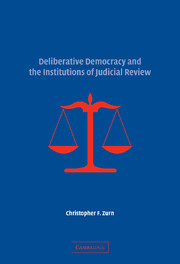The Police and the State
Security, Social Cooperation, and the Public Good
- Author: Brandon del Pozo, Brown University, Rhode Island
- Date Published: December 2022
- availability: Available
- format: Hardback
- isbn: 9781009215411
Hardback
Other available formats:
Paperback, eBook
Looking for an inspection copy?
This title is not currently available on inspection
-
As we wrestle with the role and limits of policing, a political philosopher who spent over two decades as a New York City police officer and Vermont chief of police presents a normative account of what it means to police a pluralist democracy. Invoking his vast experience, Brandon del Pozo argues that we all have the prerogative to use force to protect others, but police embody the government's unique duty to do so effectively and with restraint. He recasts order maintenance as brokering and enforcing the fair terms of social cooperation in our public spaces, for the protection of minority interests, and for a society where diverse conceptions of the good can flourish. The reasons why we police, he says, must be ones that all citizens can evaluate as equals. His book explains the democratic commitments of policing, and lays the groundwork for meaningful police innovation and reform.
Read more- Uses the principal strands of modern political philosophy to explain the democratic commitments of policing in a clear and accessible way
- Provides normative guidance as to what fair and effective policing looks like in a democracy, both for the general public, and for specialists engaged in close study of policing or political philosophy
- Uses current events and the author's experience to provide several examples of policing according to the principles and theories of the book
Reviews & endorsements
'Brandon Del Pozo's book utilizes a Rawlsian framework to provide a normative framework for policing. To date, his is the most detailed and sophisticated attempt to do so. Whether one ultimately accepts this approach or some alternative, such as a rights-based approach, his book is a significant contribution to police ethics.' Seumas Miller, Charles Sturt University, Delft University of Technology and University of Oxford
Customer reviews
Not yet reviewed
Be the first to review
Review was not posted due to profanity
×Product details
- Date Published: December 2022
- format: Hardback
- isbn: 9781009215411
- length: 240 pages
- dimensions: 235 x 159 x 20 mm
- weight: 0.52kg
- availability: Available
Table of Contents
1. The role of the police
2. The first power of the police: impartial protection and rescue
3. The second power of the police: arrest for adjudication
4. The third power of the police: brokering and enforcing social cooperation
5. Democratic priorities, relationships, and tensions: seven cases of policing
6. The bases of, and reasons for seeking, police legitimacy
7. Procedural justice in policing revisited
8. Policing with public reason
9. Policing populism, protecting pluralism
10. Primary goods, policing states in transition, and natural experiments.
Sorry, this resource is locked
Please register or sign in to request access. If you are having problems accessing these resources please email [email protected]
Register Sign in» Proceed
You are now leaving the Cambridge University Press website. Your eBook purchase and download will be completed by our partner www.ebooks.com. Please see the permission section of the www.ebooks.com catalogue page for details of the print & copy limits on our eBooks.
Continue ×Are you sure you want to delete your account?
This cannot be undone.
Thank you for your feedback which will help us improve our service.
If you requested a response, we will make sure to get back to you shortly.
×









